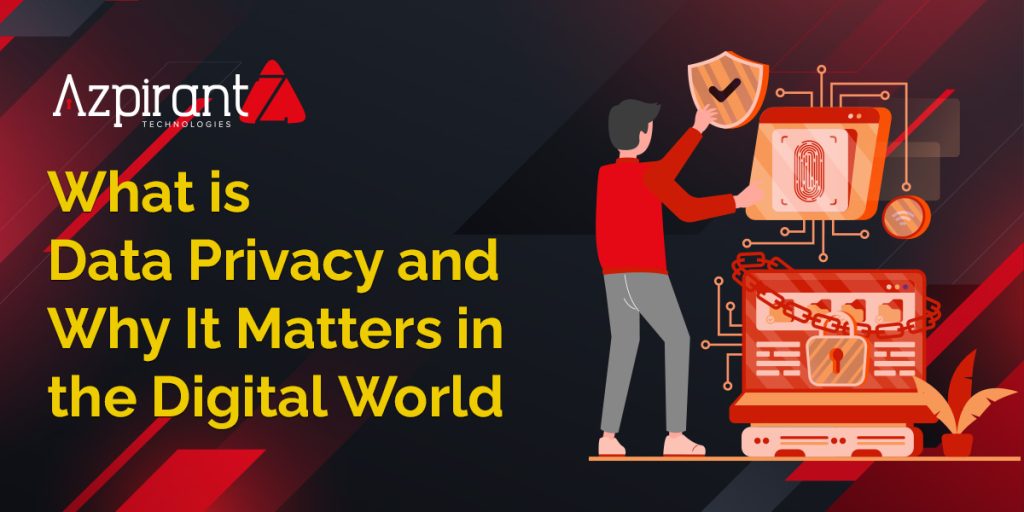What is Data Privacy and Why It Matters in the Digital World
Browse a page and you are bombarded with questions like “Allow All”, “Accept Only Necessary” or “Adjust my preferences” cookie banners. Cookies capture an individual’s personal details and they are just one way of capturing it. There are other types of recording mechanisms to capture a user’s interaction with the screen and most of them work surreptitiously behind the scenes as an innocent user browses the Internet.

Personal information like name, email address, age are grabbed and stored. Shopping habits are monitored. A digital persona of the user is formed based on their interaction with a site and algorithms might creepily cater to that persona. This information might be used to identify the user across different sites as information about the user flows from site to site.
As privacy laws strengthen, this silent of recording of a user’s digital footprint and misusing it is now being streamlined by different data privacy practices.
While, the basic definition of “Privacy” is defined as the right to be left alone, there are different types of privacy and some of them can be stated as information privacy, bodily privacy, territorial privacy and communications privacy.
Data privacy or information privacy refers to privacy of one’s personal information under various situations. Personal information or personally identifiable information (PII) commonly refers to name, date of birth, email address, physical address (though it can include other parameters as well) A person should not be identified by the information he/she provides and this is the fundamental point of data privacy.
In short it just screams “Don’t track me everywhere I go on the Internet and see where I shop, where I eat, which doctor I go to, what medicines I eat”!
“Data privacy” includes safety when collecting one’s personal information, storing the information, complying with privacy laws and regulations, sharing it with other third- party apps, using it appropriately and deleting it after the due time.
Various data privacy laws make sure that a user has appropriate data privacy rights. A user should have the
- right to know what organizations or other people know about them
- right to access information about them
- right to delete the information about them
- right to opt-out of marketing practices
The digital age is a dangerous one. On one hand we can record things and keep them for memories, but on the other hand, they can be used for malicious purposes too.
The world is supposed to create about 2.5 quintillion bytes of data every day by people sharing across different apps.
Making sure that an enormous amount of data follows all data privacy measures as stated above is truly a massive task.
This is where ‘Data privacy’ laws step in to solve some of the privacy black points.
Let us see some real-life situations where ‘Data privacy’ regulations are absolutely needed:
- Health matters:
Health issues for each and every individual is a deeply personal one. While doctors can share information to find a cure for a disease, it is an invasion of privacy when the same issues are shared with another patient or even another doctor without the explicit permission from the patient themselves. HIPAA and similar laws make sure health information is keep private.
- Children and privacy:
While privacy related to adults is a big thing, privacy issues related to children is even bigger. It might be unnerving to actually ask children their personal details like name, phone number, email address and other details for targeted advertising and using their pictures and videos without their parent’s consent. This is explicit violation of a child’s privacy and it has to be safeguarded at all costs. Privacy laws like COPPA makes sure that children are protected from the vile eyes of Internet privacy predators.
- Financial Privacy:
Just like health records, financial information is a sensitive issue for all users. Storing financial information safely and not sharing it irresponsibly are some of the chief tenets of financial privacy laws like GLBA. In addition, financial privacy laws also include credit reporting agencies who are required to provide privacy notices about their practices to the consumer.
These few examples illustrate the necessity for data privacy laws pertaining to each part of the world.
As we become more digitally connected, extra privacy regulations will be needed to keep the novel privacy fraudsters at bay!
Transform data privacy challenges into a competitive advantage. Azpirantz empowers organizations to “own their data” by providing expert Data Privacy Consulting services. They implement robust data privacy practices through a blend of technological, organizational, and legal measures. Their focus areas include data minimization, purpose limitation, data security, and upholding individual rights. By partnering with Azpirantz, businesses can cultivate customer trust, ensure compliance with critical regulations like GDPR, India DPDPA, CCPA, and ISO 27701, and proactively mitigate the risks of costly data breaches. They help you build a secure and compliant data ecosystem that fosters confidence and growth.
As we become more digitally connected, extra privacy regulations will be needed to keep the novel privacy fraudsters at bay!
Did you know?
“Privacy” is not explicitly guaranteed under the US Constitution
We're Here To Help